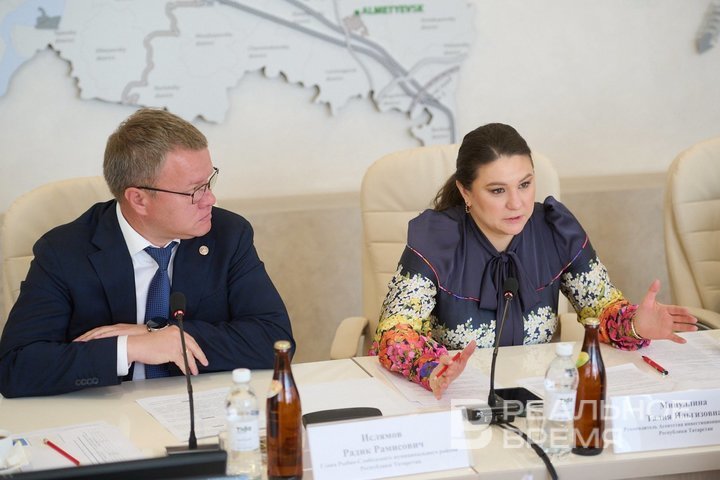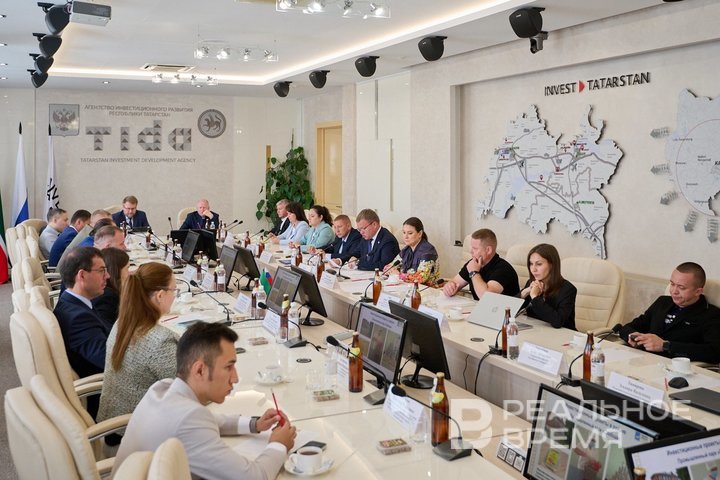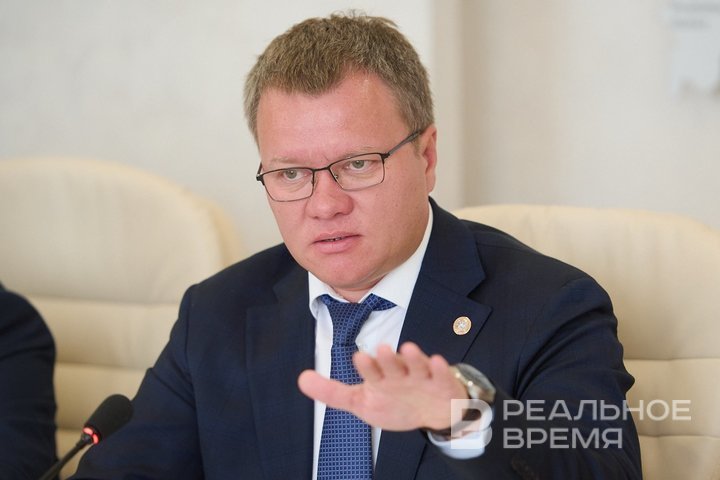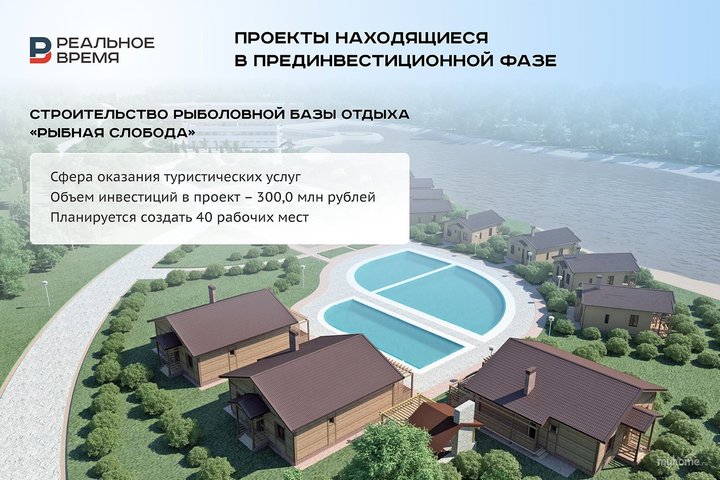Talia Minullina: ‘The main thing is to find the first Buratino who will bury his money there’
The authorities of Rybnaia Sloboda are looking for an investor to build a tourist complex on a local wasteland behind the “Field of Wonders”

Approximately 48 hectares of land in a recreational zone in the heart of Rybnaia Sloboda are being offered to an investor by the municipal authorities. The site is intended for the construction of a tourist complex with a yacht club. Other proposed projects include the creation of the Maslovka aerotown, the Kamaland fishing village, several holiday resorts, and a sanatorium with a mud therapy centre, as well as one of the country’s largest service centres for heavy-duty trucks, along with fish and dairy processing plants. In just a year and a half, 16 projects worth 2.5 billion roubles have been reviewed in the municipality, it was announced at the municipal investment hour in the Rybno-Slobodsky district on 25 June.
Who will build a tourist complex with a yacht club in the centre of Sloboda?
At the beginning of the meeting, the head of the district, Radik Islyamov, presented the economic indicators and investment potential of his municipality. The gross territorial product amounts to 9.5 billion rubles, and last year 523 million rubles of off-budget investments were injected into the economy of Rybno-Slobodsky. The unemployment rate stands at 0.1%, yet around 350 residents of Rybnaia Sloboda leave daily to work on rotational shifts, as there are no “major enterprises in the district capable of offering higher wages.”
The district has a favourable location with convenient access to transport arteries for cargo transport, as well as for the development of logistics and trade. Federal highways M12 and M7 are located 25 km away, and there is the possibility of cargo shipping from three piers with access to international maritime routes.
The shoreline stretches for 90 kilometres, and forests cover 26% of the district's territory. For this reason, local authorities are confident the area is well suited for the development of both domestic and international tourism. The eco-park Wild Farm (Dikaya Ferma) has become a popular tourist destination, which welcomed around 15,000 visitors last year. A glamping site is currently being completed there, along with the creation of new accommodation facilities — 150 million rubles have already been invested in the project. Another initiative is the eco-hotel Maslovka, which opened in 2024, with 40 million rubles spent on its development. Now the district is proposing that potential investors build a major tourist complex in the very heart of Rybnaia Sloboda — on a large, vacant plot within a 48-hectare recreational zone.
“The plot is surrounded on two sides by two residential areas: the old town centre and a new neighbourhood called Field of Wonders. It opens directly onto the bank of the Kama River, and if the bay is slightly expanded, a yacht club could be considered,” said Radik Islyamov.
According to him, there are a few interested investors, but so far, none have made a final decision. As he noted, there are no issues with connecting to utilities — gas, water, and electricity are all readily available. The land is partially hilly, but modern architects know how to integrate projects harmoniously into the natural landscape. “Is there a road leading there?” asked the head of the Tatarstan Investment Development Agency. Upon confirming that the area is accessible from all sides by several paved access roads, she remarked that the project has the potential to be quite promising.
“In a place like this, the main thing is to get started — to find, as they say, the first Buratino who will bury his money there. Why? Because when you have such a large area and one anchor resident appears, they immediately attract the others,” noted Talia Minullina. “We have two special economic zones in Tatarstan — Innopolis and Alabuga — but not a single recreational zone, even though there is a federal law allowing for it. Perhaps we should consider this particular site? I think this is a timely issue for Tatarstan — there are plenty of tourists.”
“Why not,” agreed the head of Rybnaia Sloboda.

“I don’t think their mud is any better than ours” — the district may see the construction of a second Bakirovo
The district has introduced rental benefits for land plots located within industrial parks. In the first year, a resident pays 20% of the rental fee, in the second year — 40%, in the third — 60%, and so on, until full payment is reached. These benefits also apply to land plots included in the registry for allocation to small and medium-sized enterprises.
The municipality is home to various types of raw materials and minerals: sand, crushed stone, limestone, red clay, and even therapeutic mud, which in the early 2000s was extracted for the Bakirovo sanatorium.
“They used to transport our mud there until they found their own. I’m not sure how it compares in terms of medical indicators — that would need to be analysed. But I don’t think their mud is better than ours, otherwise they wouldn’t have taken it from us. And the transport distance was significant: it’s not a short way to Leninogorsky District, so it must have been worth it. Perhaps later they stopped for economic reasons. But we still have the mud, and a sanatorium could be built there — we can allocate the land,” the head of the district promised.

The district authorities are also prepared to lease the local beach through a concession agreement (or apply a public-private partnership mechanism) for the creation of a developed embankment. One of the investors is building the Rybnaia Sloboda fishing recreation base at a cost of 300 million rubles, with 40 new jobs to be created. The goal is to provide the necessary conditions for all types of active recreation, including designated areas for fishing gear storage, relaxation zones, and a fishing shop. The plot has already been identified, and the owner plans to host Russian fishing and sports events at the base, which will help raise the district’s profile.
“Some of our heads have been transferring land for two years — well, how is that acceptable?!”
Currently, the municipality is home to a number of key industrial enterprises: APK Russkiy Mramor JSC, Rybno-Slobodskoe HPP PLC, Kulon-Agro PLC, and Logos PLC. In 2026, their ranks will be joined by another large production facility — the Rybno-Slobodsky dairy plant, with a processing capacity of 300 tonnes of milk per day and a cost of 1.5 billion rubles. Additional premises of 2,300 sq. m. are currently under construction. “The main equipment has been delivered from Spain and is already at the facility, with installation underway. So far, 910 million roubles have been invested in the project, and 200 jobs are planned to be created,” clarified Radik Islyamov.

The company Smart Farm is beginning construction of a dairy complex designed for 1,024 cows. It took some effort to reclassify the land for the required purpose, but it did not take much time, which the head of the Investment Development Agency particularly noted:
“A good project! You see, some district heads, and I won’t name names, take two years to reclassify a land plot. Well, how is that acceptable? In two years, forgive me, either the donkey will die or the padishah. It’s impossible — no investor will wait! Here is a concrete example: Radik Ramisovich organised work in the district and literally within six months brought the plot into compliance and made amendments to the general plan.”
“I had to run around with the paperwork, visiting the same office several times,” the head of the district commented, but confirmed that it is indeed feasible. The investment amount for the project is 790 million rubles, with 30 jobs to be created. “The project is very important for us due to the decline in livestock numbers over the past year and a half,” he emphasised.
There is currently no industrial park with available space in the district, so negotiations are underway to create such a facility costing 200 million rubles for 10 residents next year. The investor is the company Elgrant, which recently completed a similar project near Alekseevsk. In the only active accredited industrial park, Sloboda, there are currently three residents operating: Kisher PLC, Healthy Food Factory PLC, and Bisté PLC.
Located 8 km from the federal highway M7 is a 1-hectare municipal land plot equipped with engineering infrastructure. At the 920th kilometre of the M7, there is another available municipal land plot of 1.8 hectares designated for industrial use, intended for the construction of a filling station and roadside service facilities.
Investors are welcomed on private production sites with ready engineering infrastructure. One land plot measures 10 hectares, where a production facility of 1,042 sq. m. has been commissioned. Another area of 1.5 hectares, housing a fish processing plant, represents a turnkey business owned by entrepreneurs from another region who have decided to sell the enterprise. This site specialises in farming African sharptooth catfish.
Last year, the head of the farm enterprise, Alexander Grigoriev, commissioned a livestock complex for 150 cows equipped with robotic milking systems. In the neighbouring farm Kaparullin A.V., berry plantations cover an area of 20 hectares. To increase crop yields, the farmer is constructing a hydraulic engineering system to install a reclamation system.
Maslovka aerotown, a service station for heavy trucks, and the restaurant IKra
Among other projects in the investment phase is the Maslovka aerotown, with an investment volume of 791 million rubles, of which 81.5 million has been invested to date. The plan is to create 70 jobs. The runway has already been constructed, although it is currently unpaved. There is a hangar equipped with all necessary utilities. The concept envisages that owners of private small aircraft will be able to taxi their planes directly into the hangars, much like parking in a garage.
The investment company Sean has begun constructing a recreation base with a budget of 150 million rubles, while the freight carrier Neo Trans is building a service station for heavy trucks near the M7 highway. “So far, they have faced some setbacks due to disruptions in the transport sector in recent years, but he remains optimistic. He says that he is determined to complete this project. It will be one of the largest, if not the largest, truck service centres in Russia. They are building on the site of the old Kazdorstroy base, which they purchased, and are gradually investing,” the district head reported. The plan includes creating 250 jobs, with an initial investment of 500 million rubles.
The second project of DikayaFerma is the Kamaland fishing base. The investor plans to create a fishing village aimed at developing aquaculture by breeding carp-family fish in nine artificial ponds. The project includes the construction of guest houses for visitors, followed by the organisation of paid fishing activities. The investment volume is 100 million rubles, with 15 jobs to be created.
Individual entrepreneur Vladimir Eliseev plans to open a workshop for the production of delicacies from meat and fish. Preparatory work is underway to change the land plot’s category. The investment amounts to 25 million roubles, creating 10 jobs.
Another project along the M7: investor Vyacheslav Karpov plans to build roadside service facilities and a warehouse zone. The site will include warehouse complexes, a hotel, and a service station. The investment amount is 580 million rubles, creating 58 jobs.
Investor Bars Prom announced plans to implement an interesting project on the banks of the Kama River — the IKra restaurant, with an investment of 150 million rubles. “He is a native of Rybnaia Sloboda, but now has offices in Moscow, St Petersburg, and Kazan, and works in metal constructions. He went for a walk with his children along the embankment but found nowhere to eat. We have one café there — cosy but small. He called me and asked, ‘Can I do something like this?’ I said, ‘No problem,’” explained the district head, describing how the idea for the establishment originated.
Concluding the presentation, he reported that over the past year and a half the municipality had reviewed 16 projects with a total value of 2.5 billion rubles. He outlined new promising sectors for attracting investment — the production of foam glass products, roadside services and filling stations, glamping, and tourist zones.